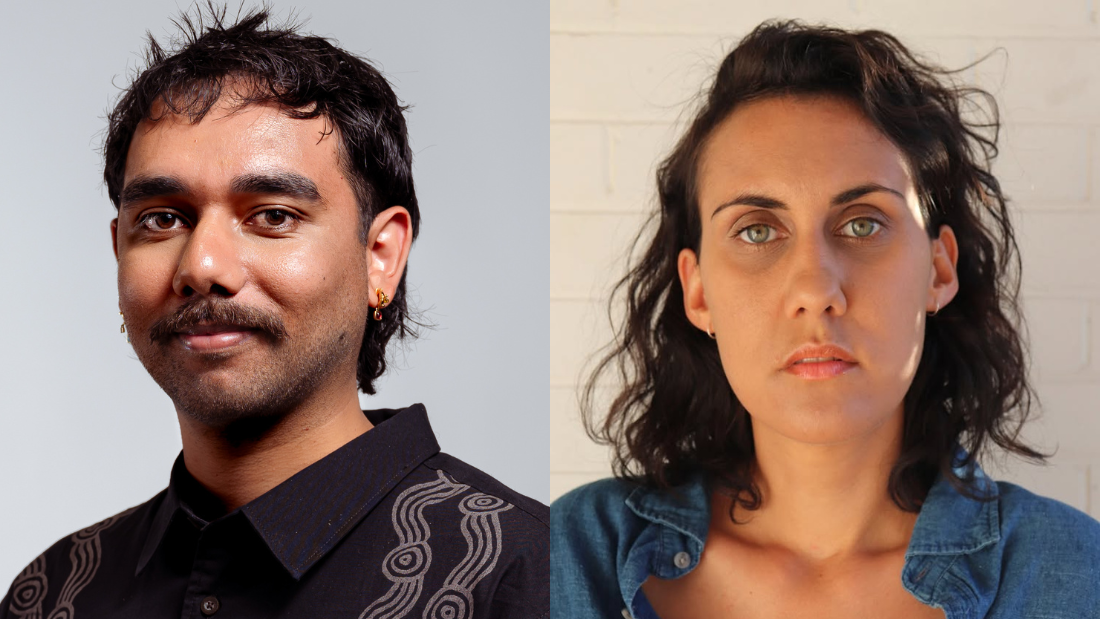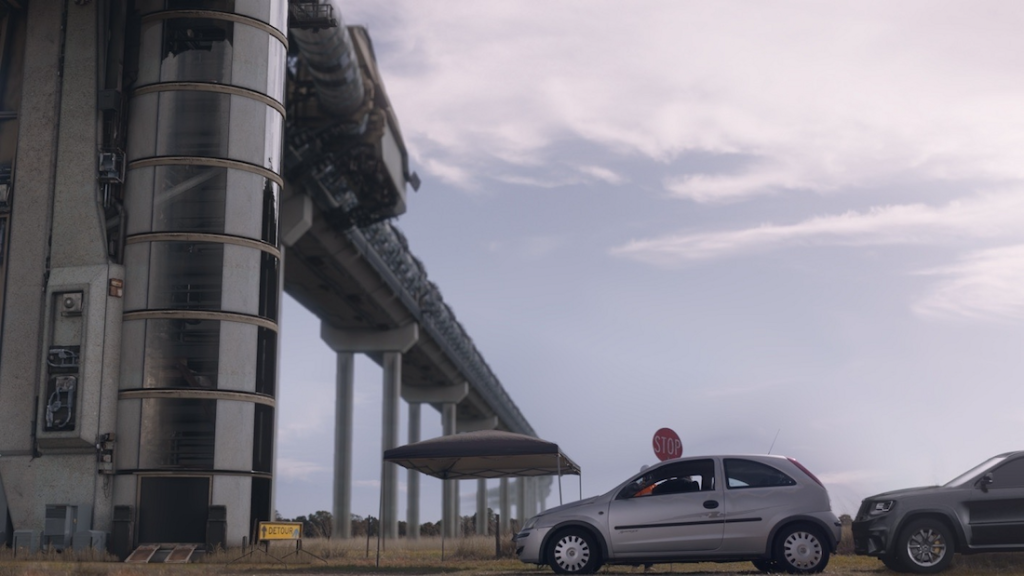
Saving Country in 2150: Farm Block A67 brings timeless message to Flickerfest 2025
Flickerfest returns to Perth this week, showcasing a diverse program of short films at Luna Outdoor Cinema from Thursday, February 20, to Saturday, February 22, with tickets on sale now. One of the highlights is set to be Farm Block A67, a Western Australian film showing as part of Flickerfest’s Best Of Australian Shorts program on the festival’s opening night of Thursday, February 20. Set in 2150, the film follows Ari, a young Aboriginal woman on a desperate mission to save her family’s farm from a greedy enemy. NATASHA PAUL spoke with co-directors Jason Haji-Ali and Simone Detourbet to find out how the film explores the ongoing struggle of Indigenous Australians to care for country within a Western-colonised society.
Congratulations on having Farm Block A67 premiere at Flickerfest 2025! How long has this film been in the works, and how does it feel to be releasing it to the public?
Jason: Thanks! I came onto the project a bit later. Simone and Nick (Harle, producer) had already spent some time on the script before they came to me to help co-direct the film. After that, it must’ve been just about a full year from pre-production through to completion, so it feels great for it to finally be out there, finished, for the public to see it.
Simone: Thank you very much! From the initial seed of the idea to now, I think it’s been two and a half years. We started the script and finished it before we applied for the Elevate70 initiative, and that’s when Jason came on board. Originally it was myself, Nick our producer, and Zach our VFX artist who were playing with the idea of future technology and VFX on a farm, and then Nick and I sat down and created a story around that. This script was written really fast, actually. It was a fun process and just sort of fell onto the page.
It’s amazing to have stories of First Nations people, and particularly their connection to country, explored in film in different ways. Where did the idea for this story originally come from?
Simone: To be honest, the film is a sort of a mash-together of certain significant events, ideas, and thoughts of mine throughout my 20s. Essentially, I have suffered major burnout a few times, and the first was in my mid-20s. I was overseas at the time and ended up experiencing severe anxiety and depression and my nervous systems took a beating. While I was overseas and pushing through, all I wanted was to come home, to my country, to my family. I was dreaming of red dirt from where I grew up in the NT and needed to find a place I felt safe. I was struggling and broken.
When I finally got home to Perth and could sit down and rest, I found myself unable to do much of anything, really. I found it hard to get up in the morning, and doing everyday tasks was overwhelming. However, I did find myself outside a lot, just sitting and being and giving all my hurt and exhaustion to the trees, the earth, the wind, and the water. I finally felt held and safe enough to slowly start my healing journey.
Because I am quite fair-skinned, I have always struggled with my identity as an Aboriginal person, and because I didn’t learn a lot of culture growing up, this only added to the imposter syndrome I carried and that still lingers slightly today. However, being outside among the trees, with my bare feet on the earth and with the smell of water in the air, was where I felt most safe and connected.
It finally dawned on me that my identity had always been and will always be rooted in my deep connection to my country. I began to deeply feel that country and my connection to it was simply in my blood, bones, sinew and spirit. I didn’t have to do anything or know everything to be Aboriginal; I just was and always have been and will be. All I had to do was step outside, plant my bare feet on the earth, and take a big deep breath in, and there I was held, supported, loved and wanted.
The idea for this film is simply a little love letter to country and how deeply important it is to me and all Aboriginal people, whether it is conscious or unconscious to them, like it had been for me. It’s a small but intentional gift of gratitude and love for taking care of me when I couldn’t take care of myself and continuing to do so to this day. I am devoted to country through and through and it is my hope that people, no matter who you are or where you come from, can find their sacred connection to country and care for it as it has always cared for us.

You both have extensive experience in the Perth film production industry. What was the experience like working on such a special film together?
Jason: For me, this was a really special film to work on. It was my first time working on a scripted project sitting in one of the director’s chairs, and we were fortunate enough to string together the perfect cast and crew to help bring our ideas to life. I’d done a fair few projects up until this point, but most of those were at a much smaller budget and scale, so this really gave me the chance to work with a crew who I felt had a lot more experience in the industry and gave me a taste of what working on bigger budget projects would be like.
Working so closely with Simone was great as well. I think it really helped us bring our own culture to life as the film developed. And for me it was such a great experience just learning from Simone over the course of the year.
Simone: Honestly, it was actually so wonderful! It was a time and experience that I am so grateful and thankful for. Working with Jason, Nick, Zach, and our amazing crew and cast was what made this project so special. Every person we worked with was handpicked from past projects and experiences or were family/friends or recommended by our crew or cast. We were literally surrounded by the most stunning and professional people who worked tirelessly to bring this film together.
We also would have been lost without the support from our parents, families, and close friends, who offered support in the way of locations, time, food, and mental and emotional support, to name just a few. Our community and loved ones made this film happen from way before we got to principal shooting, and that support continues to this day. Working with people who were so caring and respectful of Aboriginal culture was such a blessing.
Learning off professionals that are experts in their craft was a highlight for me. I was always asking questions, learning, and having as many laughs as I could with everyone. There is so much more I could say about these amazing humans, but I’ll wrap up by saying that working with Jason was the perfect match for me and this project. Finally, my co-creator, producer, and best friend Nick was the cornerstone of this film; without him, we would not be here. I have nothing but love and respect for him and look forward to our next creative endeavour together.
Jason, I understand this was your first time co-directing a scripted film, having previously worked on documentaries. How did the process of making this film differ creatively compared to your previous documentary work?
Jason: Yeah, it was my first time, and it seems like co-directing is pretty rare on projects like this. I hadn’t really had any experience directing talent to such an extent before. The documentaries that I’ve worked on are usually more observational, so having to essentially create a character and work out what they look like, act like, and essentially exist was quite a step out of my comfort zone.
But as I mentioned earlier, it was an invaluable experience just being able to learn from Simone, who has a theatre background. We worked well developing the characters, and then Simone really helped with understanding how to get the most out of an actor’s performance. We wanted to create some familiar characters, especially within the family, and I think that’s something that’s really come through in the end. It feels great to watch the film and see reflections of people we know brought to life on screen.
Simone, you previously attended WAAPA here in Perth and have done work both behind the camera and in front of the camera acting. What was the experience like working as a co-director on a project of this scale, compared to your previous production roles?
Simone: It honestly felt very affirming. I have always felt more comfortable and natural in the role of director, or co-director in this instance. Holding the artistic vision, caring for all the humans involved, and facilitating a loving and safe space is where I function at my best and feel the most inspired, energised and purposeful. I love holding safe space for people and their stories.
Since the principal shoot of Farm Block A67, I have worked on two major productions in my hometown of Darwin for Netflix and Amazon Prime. I must say that even though those productions were incredible to work on and I grew my skills and experiences, I hold our short film very close to my heart. It is a personal story of identity, grief, love, and connection, and I think that trumps the scale and prestige of any past project I have worked on. I think simple and intentional things can be the most profound, and I think that is at the heart of our film.
Is there a specific message or theme either of you hopes viewers will take away from the film?
Jason: For me, I hope the message people get is that we, as Aboriginal people, are still here; we’re not giving up; a lot of strong leaders have come before us, and there’s a younger generation who are just as prepared to continue what our Elders have been doing. And for any mob watching, I hope they can be inspired, maybe see a reflection of themselves or someone they know in the characters, and have a laugh on the way.
Simone: All I want is for people to love the country, deeply connect to it, and care for it as I do and as our ancestors have done for time immemorial. I want people to be encouraged to step outside barefoot and just breathe. I want our mob to remember themselves deeply through the connection we have so we can love and heal ourselves and in turn love and support others as they heal. And hopefully, this love and healing will help us dream of a better world, and we can bring that world to life. Let’s care for our mother, our country, as we have been cared for.
What are your plans for the rest of the year? Do you have any exciting future projects lined up, collaboratively or individually?
Jason: I don’t have a lot on my plate at the moment, which might be a good thing for now, considering how busy the last couple of years have been. I’ve been one for writing, so I’m actually hoping to spend a lot of my spare time writing this year, so I’m sure it will be a year of learning, but hopefully something can come from that, and who knows, hopefully that’s something screen worthy one day.
Simone: Honestly, at the moment, my main focus is uni. I have just started my undergraduate in psychology and I am really happy about it and excited to get started. As for my arts practice, I have an idea swirling around in my mind that has been incubating for a few years now. I hope to get some time to put it down on paper and just maybe get some seed or development funding to further develop it with Nick. And if Jason is around, maybe he’ll be keen to join us in some way. But enjoying my life and finding joy alongside work and uni is my main focus right now.
Farm Block A67 is showing at Flickerfest’s Best of Australian Shorts at Luna Outdoor Cinema on Thursday, February 20. Tickets are on sale now from flickerfest.com.au
